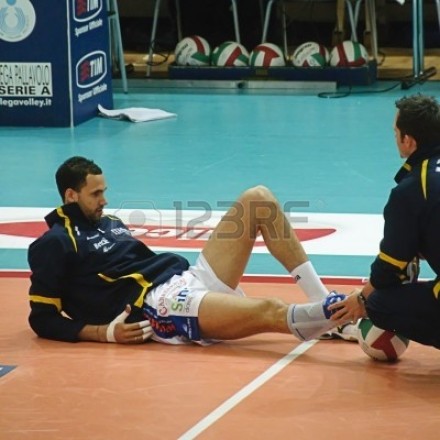
Juantorena stretching
Hip Flexors
In volleyball, you’re often in a defensive position—bent over at the hips with your butt stuck out—leaving you susceptible to developing short, inflexible hip flexors. Tight hips flexors can restrict your range of motion limiting the ground you cover on the court and can eventually lead to low back pain.
Stretch: Lunge forward with your left leg and feel a stretch in the front part of your right hip. Then reach your right arm straight up in the air to isolate a different area. Be sure to switch legs and stretch both sides.
Quads
The most common overuse injury reported in volleyball athletes is patellar tendinitis or “jumper’s knee.” Jumping from a crouched position to block or spike a ball causes your quadriceps to contract and puts stress on your knees.
Stretch: Lie on your side and pull your heel towards your glutes. You can also pull your hip back into extension in this position to incorporate the hip flexors.
Another way to stretch your quads is to lie on your stomach and pull your heel to your glutes.
Although effective, I don’t recommend the “hurdler position” (knee crossed behind the body instead of in front) due to the increased stress placed on the knee.
Hamstrings
These muscles work in conjunction with your quads and aid in stabilization power production. Although they are usually overlooked in strength training, the hamstrings play a vital role in jumping, landing, and lateral movements.
Stretch: In the standing position, step forward with your left leg, keeping your knee straight (bend your right knee slightly) and move your chest closer to your thigh. Pull your toes upward and feel an isolated stretch behind the knee.
To further stretch the high hamstring area, bend your left knee and move your chest even closer to the thigh.
The modified “hurdler” stretch also works well. Keep your back straight and toes up to emphasis behind the knee.
Calves
Overuse of the calf muscles when jumping to block or spike can cause tightness in the calves which can lead to foot pain such as plantar facilities and Achilles tendonitis.
Stretch: There are a few different ways to stretch your calves, choose whichever one works best for you.
- Push against a stable object.
- Hang your heel off a stair or bleachers.
- Push back with a straight knee while both hands and feet are on the ground.
Glutes
These muscles can easily get tight due to the large amount of side to side movement and constantly being in a squat position during volleyball.
Stretch: In the seated position, bend your right knee and cross it over your left. Then pull your right leg to your chest. You can also bend your left leg and cross your right leg over your left leg.
For similar stories, click on Stretching.